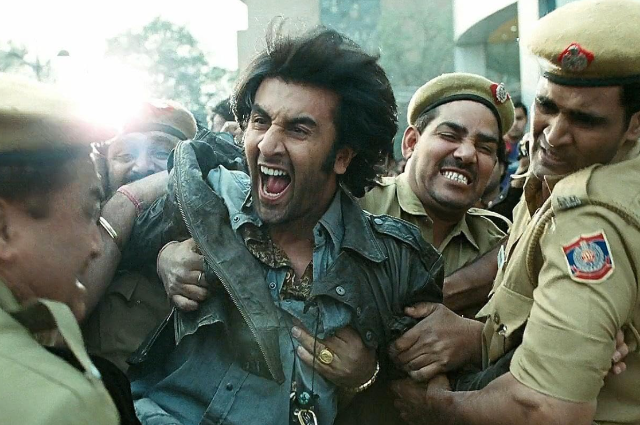Movies in the 20th century were a novel phenomenon in terms of storytelling, which offered the audience a different set of entertainment to counter their day-to-day mundane activities. First came the silent era, made famous by performers such as Charlie Chaplin and Buster Keaton by their simple yet universal comic appeal and innovative stunt production that would leave the viewers in awe. Subsequently, classic literary works such as Pinocchio, Snow White, and Cinderella were adapted into screenplays to be displayed on the silver screen by the Disney company. Soon after, the Academy Award, aka the Oscars, were also established to honour the best pieces of cinema in various departments, ranging from acting to editing to production design to direction and to best picture. The industry grew not just in Hollywood but also in Colonial India, with he first movie being Alam Ara featuring an outstanding performance, and due to the political climate then, the Bollywood industry was established in Mumbai. A trend of entertainment flourished in both the entertainment industries, with Hollywood experimenting with a diverse set of entertainment material and genres ranging from animation to thriller to action to sports to psychological films whereas Bollywood during that same period featured what they have been covering till this very day, musicals centered around the themes of love.
But what appeared to be an industry featuring daily programs to viewers to be watched with their families on the weekend after slogging all week to relax, refresh, entertain and calm their minds soon saw itself moving towards a phenomena of portraying political agendas through cinema because the makers felt that they can bring about a change in society via this process, but this process also proves as to why cinema and its method will always be meant for entertainment rather than providing solutions for political and social phenomena.
It started in the 80s, were filmmakers wanted to portray the real side of life in their films as opposed to providing a sense of storytelling meant to entertain the audience. Thus, the birth of ‘’ Parallel or Art cinema” took place where filmmakers argued with their contemporaries who were making entertaining cinema that their medium wasn’t just meant to provide escapism or enjoyment but to reflect the political scenarios of a given particular time. This led to actors portraying ordinary people on TV and big screens. This dissipated in the 90s, where the trend of entertainment once again took place, but soon in the 2000s, more specifically since 2006, movies featuring Aamir Khan, such as Rang de Basanti(2006), Taare Zameen Par(2007), and 3 idiots(2009).
Although novel in terms of filmmaking, but these methods fall short in terms of societal change due to several reasons.
Firstly, the audience or viewers should realise that the process of discovery and change requires years in any field, and even by the masters of those fields and filmmakers and their services are meant for escapism, and that’s what they should be respected for rather than demanding social change for them. For example, a PhD student in literature would take five to six years to complete his or her PhD, and that’s just the beginning of their journey y and it’s only after years of solid research that they are looked upon as a credible individual in their field. Films, at best, could start an iota of discussion regarding a particular concept, but they could never replace the mandatory research to take place in that field, and debates and discussions have no end.
Secondly, the screenplay and music don’t solve concepts or make opinions of the filmmaker right. If an actor is performing a monologue or enunciating a piece of given dialogue in a scene dealing with a particular societal or scientific problem, with the music playing in the background to enhance the emotion in that scene, that doesn’t justify or make the filmmaker's views or opinions on that problem right. The music and heartfelt delivery at best could move the viewer at the point in time the viewer is watching it, but it doesn’t solve the societal problem I’m the long run. Understanding any concept or problem is not an easy task and requires deliberate and conscious effort and thinking for years by connecting various subjects and fields to analyze that problem. For instance, the issue of traffic in our country, and many people might assume that it’s an ethical problem, but it’s just a part of that. This type of problem requires research from law, civil engineering, environmentalists, economists, health care professionals, automobile engineers, etc. A problem or concept cannot be contained within a 140-page-long screenplay to understand the solutions to that issue, because at best it will just form a narrative, and rather it requires years of long research to understand any phenomena or problems and solutions behind them.
Third, the arrogance and superiority of entertainers are further enhanced or worsened by PR and marketing teams. For the most part, the entire narrative of changing the world via cinema is a marketing and PR gimmick meant to enhance the actors livelihood and any criticism about their work in which they talk about solutions to any problem is met with harsh verbal jabs from them and their teams rather than opening up a channel for accepting healthy criticism or discussion and debate. They, at best, manipulate the masses by distracting them as per the orders given to them by political parties to run their agendas within the masses, as they feel they provide us with enlightenment or solutions. This isn’t the case with authors of literature or poets who want to write something honestly and are open to criticism of their works from all fields rather than displaying a pompous arrogant figure and that is why many people claim the television to be an idiot box and they also said that if the king doesn’t solve the problems of the masses, he provides them with free ration and cheap entertainment so that they never revolt.

